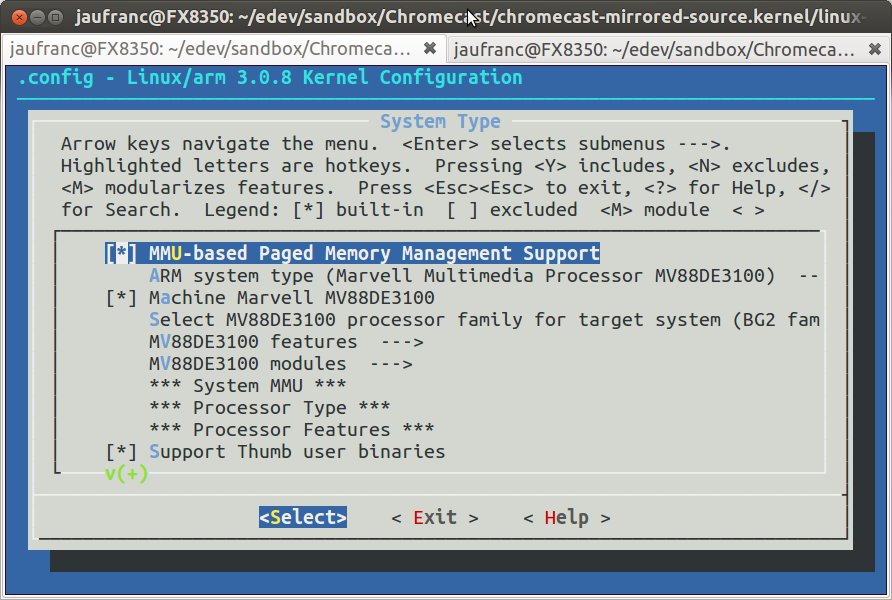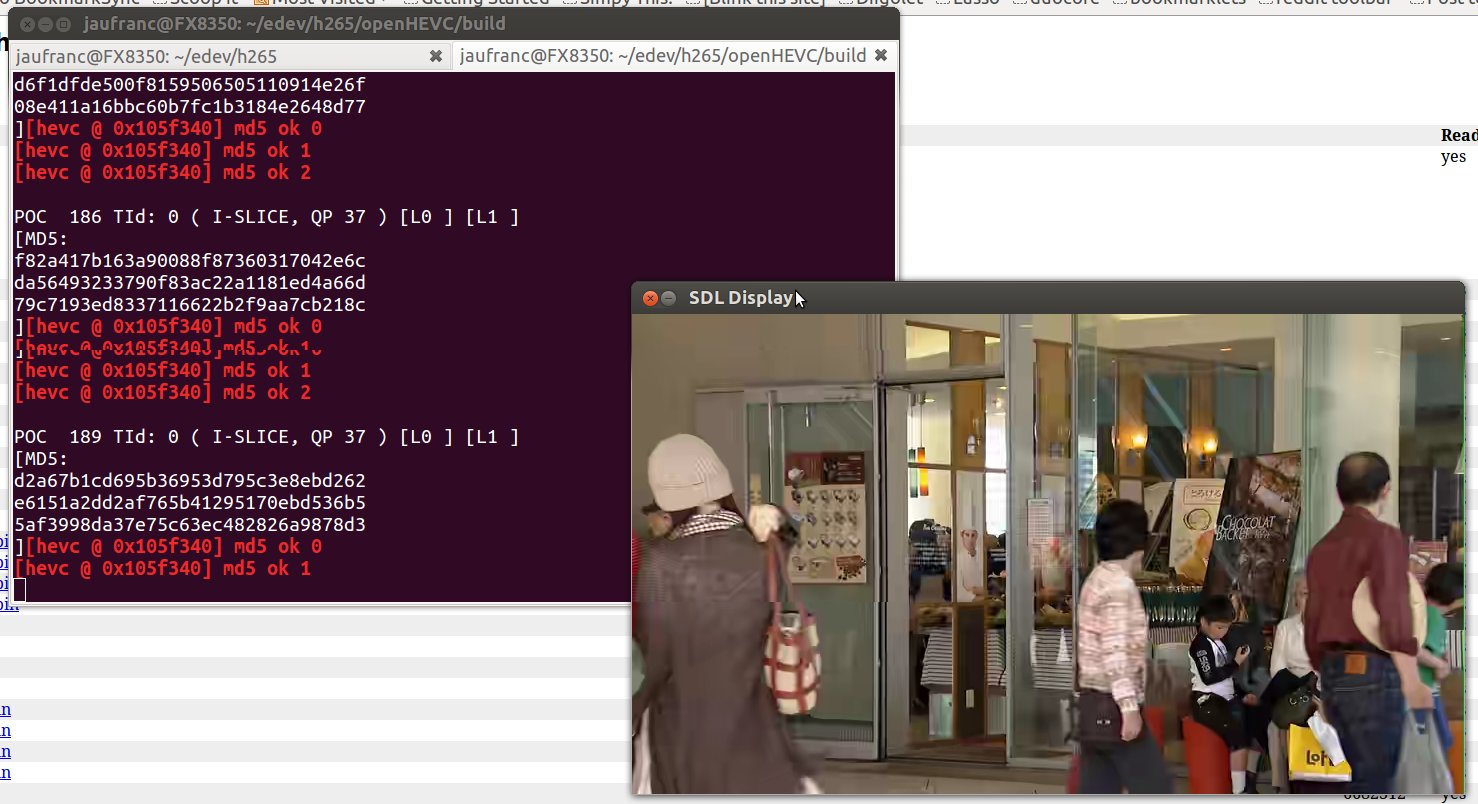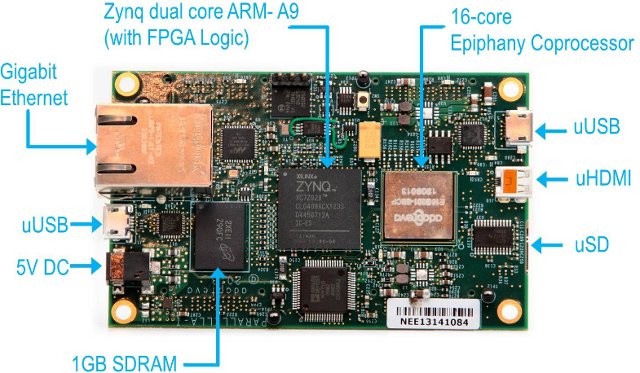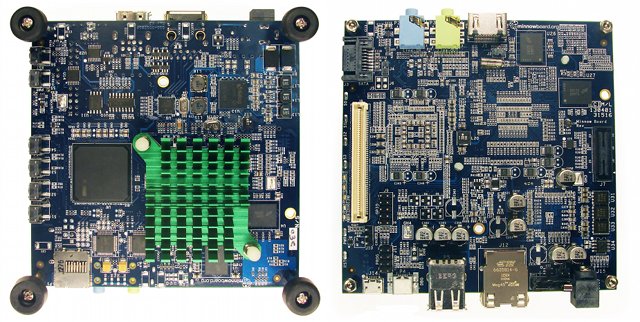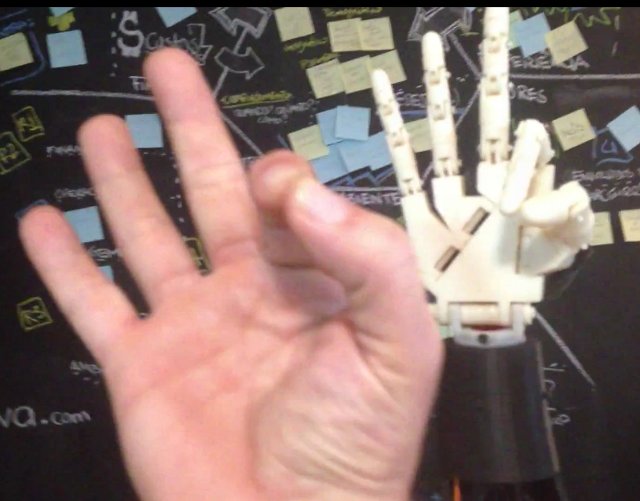Google has made quite a stir by introducing Chromecast, and entering the HDMI TV Stick market. We already know the device is based on Marvell 88DE3005 SoC with 512 MB, and since the product are already been shipped to customers in the US, it was just a question of time before the release of the open source code, and everything you need appears to be available at https://code.google.com/p/chromecast-mirrored-source/ Let’s have a look at what we have in the different repositories: Wiki – Empty… Kernel – Linux 3.0.8 source code Prebuilt – Binary toolchain: arm-unknown-linux-gnueabi-4.5.3-glibc Toolchain – Source code for the toolchain above. External – Source code for alsa-libs, dnsmask, libexit and nss sdk – bootloader and DirecFB 1.6.1 vendor – Looks like qt source used in some netflix app (not sure) Chromium – README explaining how you can download Chromecast Chromium source code: 1.8GB tarball + you need to contact […]
Linux-Rockchip Developers Community Up, Rockchip Development Boards Coming Soon?
Companies like Freescale and Texas Instruments provide good software support, and documentation, which is why they can be found in many embedded devices, because without documentation or source code low-level customization is nearly impossible or extremely time consuming. They also usually open most of the documentation and code, because they understand this can foster the use of their chips. On the other hand, Chinese-based SoC manufacturers focus on high-volume platforms such as tablets and smartphones, and usually management don’t understand the advantage to make documentation and GPL source code available, or even may consider it bad for business. Some individuals and small companies do not see it that way however, and they either want to access to the source code to improve existing mobiles devices, or use low cost Chinese SoCs to provide highly customizable hardware and software solutions. So source code and documentation have started to leak, and tools […]
Play HEVC/H.265 Videos and Embed HEVC Streams into MP4 and TS Files with openHEVC and GPAC
I wrote an introduction to H.265 (aka HEVC) at the end of last year, including instructions showing how to encode videos to HEVC using the reference implementation. It worked but since it was not optimized for speed, it was extremely slow. Today I’ve stumbled across openHEVC, a open source compliant HEVC video decoder written in C, created as a fork of Libav. This is supposed to work pretty well as the implementation was used at Roland Garros Tennis tournament to playback an 720p50 HEVC stream transmitted over DVB-T2, IPTV, and MPEG DASH. Today I’ll mainly tried out the instructions provided on openHEVC github repo including: Build the source and playing a raw HEVC stream with hevc utility Build GPAC (open source multimedia framework), to get MP4Box, mp42ts, and MP4Client utilities. Import a raw HEVC stream into MP4 and TS containers, and play it back with GPAC tools. I’ve performed the […]
$99 Parallella Supercomputer is Now Open Source Hardware
Parallella is a low cost supercomputer designed by Adapteva using Xilinx Zynq-7010/7020 FPGA+2x Cortex A9 SoC combined with Adapteva Ephipany 16 or 64 cores epiphany coprocessor. The project had a successful kickstarter campaign which allowed then to provide the 16-core version for $99, and the 64-core version for $750. The board will soon be shipped to people who pledged on kickstarter, and one of the promise of the campaign was to fully open source the platform, and today, they just fulfilled that. Before going into the details of the open source release, let’s have a look at the specs: SoC – Xilinx Zynq7000 Series (Z-7010 or Z-7020) Dual-Core ARM Cortex A9 with 512KB L2 Shared Cache Coprocessor – Epiphany Multicore Coprocessor. The Parallella-16 board includes the 16-core Epiphany-III processor The Parallella-64 board includes the 64-core Epiphany-IV processor System Memory – 1024MB DDR3L Boot Flash – 128 Mb QSPI Flash Indicators […]
$199 Minnowboard is an Open Source Embedded Board Powered By Intel Atom E640 Processor
Minnowboard is a development board designed by Intel’s Open Source Technology Center, powered by Intel Atom E640 processor @ 1GHz with 1GB RAM, SATA2 and Gigabit Ethernet support, and several embedded I/O such as SPI, I2C and CAN, and that ships with Angstrom Linux distribution. Minnoboard Specifications: Processor – Intel Atom E640 @ 1GHz (32bit) Chipset – EG20T Intel Platform Controller Hub GPU – Integrated Intel Graphics Media Accelerator (GMA) 600 System Memory – 1 GB DDR2 RAM Storage – 4 MB SPI Flash (for Firmware), micro SD card slot and SATA Video Output – SDVO to DVI (over HDMI connector) Audio – 1/8″ (3.5mm??) jack line Input and Output I/O: 1x SATA2 3Gb/sec 2x USB host ports + 1x micro USB device 1x Serial debug via Serial (UART 0) to USB conversion (mini-USB-B port) 10/100/1000 Ethernet PCI Express Expansions: 8x Buffered GPIO pins 2x GPIO controlled LEDs 4x GPIO […]
Open Source Prosthetic Arm Controlled By Muscle Movements
Gustavo Brancante is working on a very interesting project that let you control a prosthetic arm with your muscle movement using open source technology with InMoov Hand (which can be 3D printed), Arduino Uno R3, and Olimex Electrocardiography electromiography shield (SHIELD-EKG-EMG). This is called a Myo-Electric Prosthesis. Gabriel wrote a tutorial to use his “open arm” which I’ll summarize here. On the hardware front, you’ll also need a UDP compatible Wifi Shield configured as a UDP server with a fixed IP in the same LAN as the smartphone, and 57600 bps. TouchOSC (for smartphone and Workstation) is used with the following layout for calibration and feature selection. Finally load the program below to your Arduino board: Once everything is connected together, you should be able to do that: The demo looks impressive, but this is still work in progress, and next step will be to use a four channel EMG instead […]
Souliss Automation and IoT Framework Makes Your Home Smarter
Souliss is an open-source framework written in C/C++ for the Internet of Things and home automation that runs on Arduino boards, or other Atmel AVR MCU based boards, and let your control lighting, heating, or anything else you can think of via your Android device, or switches connected to your board(s). You can get started with Souliss in 3 steps: Getting the building blocks, for example: Arduino, Olimex, or other AVR boards (See list of supported boards) Relay boards ON/OFF Switches, Lights, etc… Wi-Fi router Download and load Souliss to an AVR powered board controlling real things such as lights. Monitor and/or control via Souliss Home Automation App for Android. A detailed getting started guide is provided on Souliss Google Code page. Internally, the framework is composed of three parts: Souliss, an application level layer, MaCaco, a communication protocol and vNet, a transport layer. I’ll skip details in this post, […]
Yocto Project 1.4 “Dylan” Release
The Yocto Project Release 1.4 has just been announced. This release codenamed “Dylan” and based on Poky 9.0.0 is the sixth release of the project. The Yocto Project is a framework that creates embedded Linux distributions, and has been getting more and more traction with silicon vendors such as Intel, Freescale and Texas Instruments. Yocto Project 1.4 bring the following new features and updates: Major performance improvements – The overall build time has been reduced by more than 10%. Kernel build time is reduced by about 25%. With rm_work enabled, 40% less storage will be used for the tmp directory. Smart, a replacement for zypper Support for read-only rootfs Wayland support, an X replacement. Systemd support, a replacement for the system V init daemon. Usability improvements to HOB, bitbake, yocto-bsp and other tools, including UI improvements, new features and bug fixes. Documentation improvement/update and a new kernel development manual and […]


